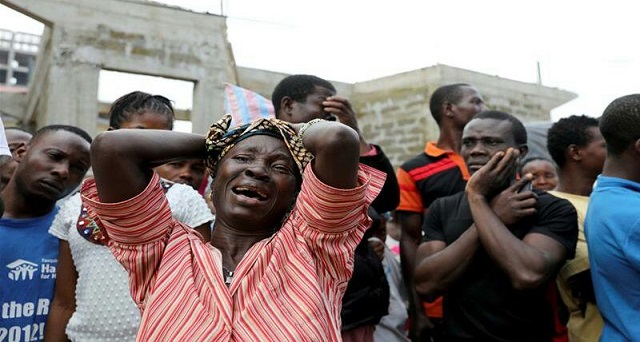
Freetown, Sierra Leone | AFP | The first mass burials of victims of Sierra Leone’s devastating floods and mudslides take place on Thursday, as blame grew over government “inaction” over deforestation and poor urban planning.
As it emerged that at least 105 of the dead were children, citizens and experts alike questioned why the government of President Ernest Bai Koroma had not done more to tackle illegal construction in the overcrowded capital Freetown.
A Red Cross official told AFP meanwhile that smaller mudslides had occurred since Monday in eastern Freetown and in Sierra Leone’s second city of Bo, with the rainy season far from over.
“There is a fear that more trouble is imminent,” in Freetown, a coastal city of around one million people, said Adbul Nasir of the International Red Cross.
The disaster began on Monday when heavy rains hit the city and the partial collapse of a hillside triggered mudslides, engulfing homes and wreaking destruction.
Although the death toll is officially 300, rescue workers privately agree the toll is far higher. An unofficial morgue toll put the number of deaths from at 400.
The UN has said 4,000 people are affected by the mudslides and flooding.
Citizens were given the deadline of Wednesday evening to identify their loved ones at the overflowing central morgue, and the first mass burials will begin at 3 pm (1500 GMT) in Waterloo, a nearby town where many victims of the Ebola crisis that hit the nation in 2014 were also laid to rest.
The burial of bags filled with body parts has already taken place but Thursday marks the first burials of corpses in a ceremony to be attended by Koroma.
– ‘No place to sleep’ –
For the thousands of survivors left homeless, UN agencies distributed food and hygiene kits to those sheltering in government centres and in the homes of neighbours and family members.
The UN Office for the Coordination of Humanitarian Affairs (OCHA) said 3D mapping of affected neighbourhoods was taking place around Sugar Loaf mountain, which partially collapsed on Monday, and said voluntary evacuations may extend to more areas, potentially increasing the number of displaced.
“We have no place now to sleep, only in a neighbour’s house,” said Abdul Bendu, in the Pentagon community, which sits directly below the devastated hilltop village of Regent.
He estimated that 100 people from his community alone had been killed by mud, falling rocks and floodwaters.
UNICEF called the damage “unprecedented” on Thursday and warned children were at risk, while the UN humanitarian affairs office said four registration centres for unaccompanied minors had been established.
 The Independent Uganda: You get the Truth we Pay the Price
The Independent Uganda: You get the Truth we Pay the Price





